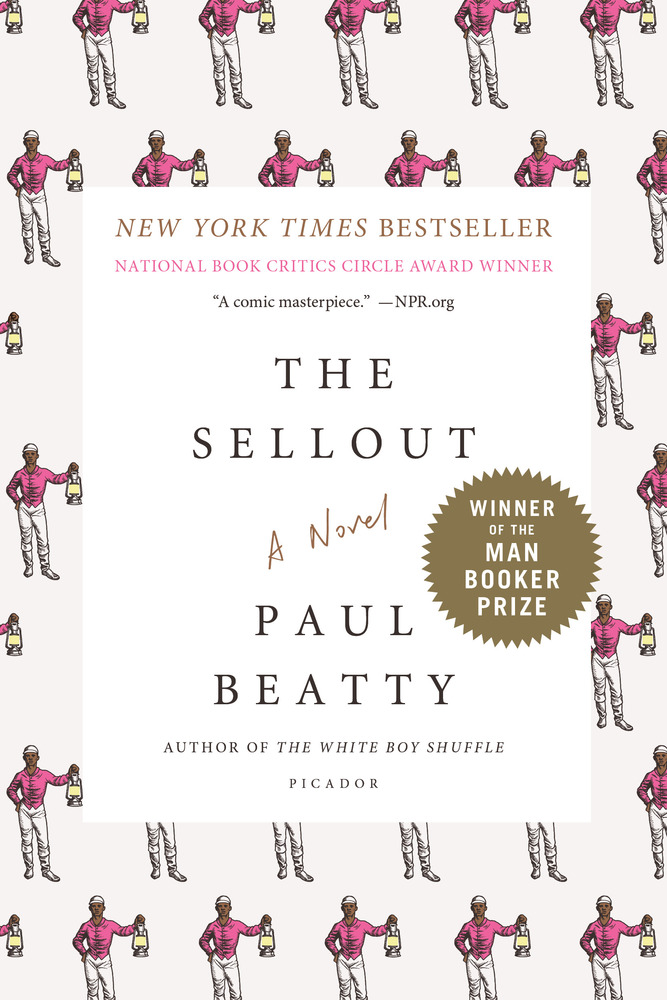 The Sellout
The Sellout
Paul Beatty
Farrar, Straus and Giroux (hardcover) / Picador (paperback), 2015; 304pp
Entering the world like the bastard love-child of a Chris Rock routine and a Thomas Pynchon novel, The Sellout is a sensational satire on race relations in the United States. Its outrageous plot, which reintroduces segregation to a forgotten ghetto in Los Angeles County, motors along in the background of a series of brilliant set-pieces fueled by taboo-busting invective. Paul Beatty’s Man Booker Prize triumph last month (he’s the first American author thus honored) is a richly deserved boost to the book, which will hopefully find a wide readership in the years to come as a consequence of the win. And reaching readers feels urgent: the protagonist’s contrarian position on political correctness and establishment thinking about “black America’s problems”, which leads him down a legal rabbit-hole that ends at the Supreme Court, lays the ground for a spookily timely jolt to liberal thought. Ends and means may not always line up; what seem like blasphemous methods may advance a just cause much further. How should we proceed when so little has been achieved going about things the so-called right way? Offering an answer, or at least provocatively worrying away at the question, is the submerged serious intent of Beatty’s book.
Our hero, known variously as “Me” (in his Supreme Court case) and “the Sellout” (by adversarial intellectual Foy Cheshire), is a watermelon and marijuana farmer in Dickens, California. He’s the son of “a social scientist of some renown”, so “wasn’t punished, but broken of [his] unconditional reflexes… wasn’t loved, but brought up in an atmosphere of calculated intimacy and intense levels of commitment”. (The language of social science is pilloried throughout.) A confluence of strange and devastating events brings him to a crossroads. His father is murdered in a pointless police shoot-out. Dickens is removed from the map of California by a sotto voce bureaucratic edict intended to toe it under the rug. And Hominy Jenkins, the (fictional) last surviving Little Rascal, terrified that Dickens’s disappearance means the foreclosure of his minor-celebrity appeal, petitions to become Me’s slave after Me saves him from a botched suicide attempt. Together, they decide to reanimate Dickens, erecting new road signs and painting a crime-scene outline around its perimeter. But it’s not enough.

Paul Beatty
At first, the changes they make are subtle. A sign on a Dickens bus reads “PRIORITY SEATING FOR SENIORS, DISABLED, AND WHITES”; those who get to the end of the sentence write it off as installation art. But when a new real-estate development heralds the arrival of a whites-only academy across the road from Dickens’s own failing school (where, in one of the book’s highlights, the Sellout castrates a calf as part of Career Day), things start to progress at speed. “It’s the signs,” the school’s assistant principal remarks to Me. “People grouse at first, but the racism takes them back. Makes them humble. Makes them realize how far we’ve come and, more important, how far we have to go. On that bus it’s like the specter of segregation has brought Dickens together.” Me has an even more radical take: “Apartheid united black South Africa, why couldn’t it do the same for Dickens?” Before long:
In the fiscal quarter since the Wheaton Academy’s inception, employment in Dickens was up an eighth. Housing prices had risen three-eighths. Even graduation rates were up a quarter. Finally, black people were in the black.
This is a pretty radical position for a twenty-first-century novel to arrive at: that progress of the kind that liberals can only dream of might be achieved using ethically reprehensible and retrograde methods. But isn’t that the purpose of satire? The Sellout presents a broadsiding challenge to a society that celebrates “twenty-four-hour access to chili burgers, Blu-ray, and Aeron office chairs” but sanitizes both its past (Foy Cheshire’s reworked classics include a version of Huckleberry Finn with the N-word completely excised and Measured Expectations) and the hardworking present-day underclass that sustains such luxury (of goods and of thought). Beatty persistently undercuts America’s achievements to highlight its abiding flaws, right from the book’s first paragraph, which ends with the Sellout in the Supreme Court, sitting “in a thickly padded chair that, much like this country, isn’t quite as comfortable as it looks”.
Interestingly, Beatty doesn’t think of himself as a satirist. “I’m surprised that everybody keeps calling this a comic novel,” he told The Paris Review. “I mean, I get it. But it’s an easy way not to talk about anything else.” And it’s true that the book’s comedy is so accomplished that it’s hard to write a review that doesn’t comprise solely of the choicest quotes (Dwight Garner, in The New York Times, confessed that his arm began to hurt “underlining the killer bits”). The Dum Dum Donut Intellectuals, and Foy Cheshire himself, are worthy of late Pynchon, while the Sellout’s riffs on everything from public transport to sex could have been transcribed from Richard Pryor tapes. It’s an extremely funny book. But to harp on the fact of its comic successes is to fail to reckon with the book’s queasy supertext. The Sellout challenges the liberal fantasia of integration (“Here, in America, ‘integration’ can be a cover-up”) and compels its readers to take a long hard look at what it means to be them, whether they’re a person of color or not.
In an uncomfortable vignette towards the end of the book, a black comedian interrupts his own set to eject a white couple who’d up to that moment been happily enjoying it. Here, Beatty anticipates movies like Dear White People, the million think-pieces on Beyoncé’s Super Bowl 50 halftime show, and the growing outrage around cultural appropriation, an outrage that seems to marry a raging new pride in previously oppressed communities with a desire to hold close what comes out of them. “Get out,” the comedian says. “This is our thing.” Me is troubled, as many readers may be in the subdued final pages. “I wish I’d stood up to the man and asked him a question,” he writes: “‘So what exactly is our thing?'”
You can see Paul Beatty at House of SpeakEasy’s Seriously Entertaining event Aiding and Abetting at Joe’s Pub at The Public Theater on December 6, 2016. Buy tickets here.




